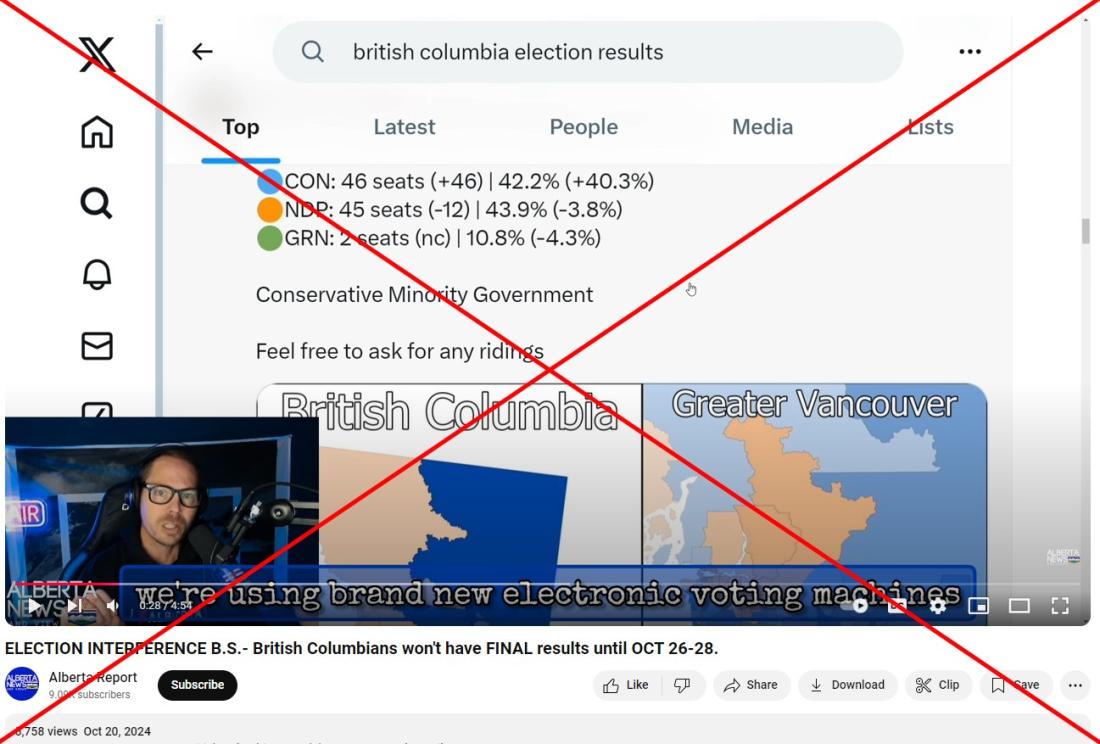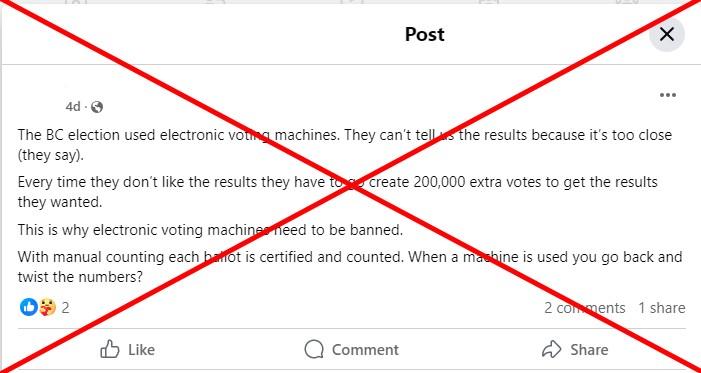
Voting machines did not delay results in British Columbia election
- This article is more than one year old.
- Published on October 25, 2024 at 23:00
- 3 min read
- By Gwen Roley, AFP Canada
"We're using brand new electronic voting machines, so you're not allowed to see the results until October 26," claims the speaker in an October 20 YouTube video.
Other users on X, Facebook and Rumble allege the lack of final results in the British Columbia election on October 19 is due to some sort of error with voting equipment. Some invoke debunked conspiracy theories about Dominion Voting Systems, claiming the province's results were rigged or that a recount had been triggered because it used the firm's "voting machines."


Dominion, which makes election hardware and software, won a settlement worth hundreds of millions of dollars in a defamation lawsuit against Fox News alleging the network knowingly aired false claims linking the company's voting tech to a conspiracy to undermine the 2020 US election. Even after the lawsuit, allegations about the company still crop up in the United States and Canada.
The British Columbia race was marked by a neck-and-neck competition between the ruling BC New Democratic Party (NDP) and the ascendant Conservative Party of British Columbia. By the end of election day, there was no clear projection of which party would form a government, and attention turned to a final count for the whole province and recounts in two ridings scheduled for the following weekend.
Elections BC, the province's election agency, told AFP on October 24 that officials counted the votes using Dominion tabulators -- but the recounts are not because of the equipment's performance.
Rather, provincial election law (archived here) requires a hand recount for any race where the front-runner is ahead by less than 100 votes, as was the case this year in the districts of Juan de Fuca-Malahat and Surrey City Centre.
"It's just because it's what the law is," said Elections BC spokesman Wesley MacInnis.
"We can't really speak to the intent of the legislators of adding that provision to the act, but I will say that tabulators are accurate."
Final count and recount
Elections BC announced in an October 24 press release that a one-vote discrepancy between an inventory of ballots cast and a tabulator result in Kelowna Centre would result in a partial hand recount in that riding (archived here).
The agency said this was likely due to human error and that the machine in question produced accurate results during testing. All recounts were to begin October 27.
Election officials also planned to conduct a final count for the entire province October 26-28, but not due to a tabulator malfunction.
"There's always been a final count no earlier than four days after election night," MacInnis said, citing provincial law.
"What appears to be happening with this election is that, because the results are so close and voters don't have clarity on which political party will be able to form government, the final count has become really important."
MacInnis said the final count mostly consists of mail-in ballots, and the pause after election day is required to assess eligibility. Officials will use tabulators to conduct the final count (archived here).
Tabulator testing and scrutineers
While some social media posts imply this is the first time British Columbia has used ballot tabulators, MacInnis said officials have previously used the technology in provincial by-elections (archived here).
He said that before voting begins, each party participates in tabulator testing where candidate representatives feed pre-selected "wild cards" into the equipment to assess whether it will produce the anticipated results (archived here).
He added that candidate representative observers, or scrutineers, were present on election day and would be present during the final count and recounts.
"We have seen some misinformation online that under BC's modernized voting model there's no scrutineers and it's just false," MacInnis said.
Stewart Prest, a political scientist at the University of British Columbia (archived here), told AFP there is a distinction between tabulators and voting machines, adding that the former does not raise election integrity concerns for him because officials retain paper copies as a fail-safe.
He confirmed the recent delay in results is because Elections BC followed procedure to ensure they are accurate.
"All this machinery exists and has existed prior to this election, and it exists to ensure the integrity of the election is respected," he said October 24. "What it really drives home is just how close this election was."
Read more of AFP's reporting on misinformation in Canada here.
Copyright © AFP 2017-2026. Any commercial use of this content requires a subscription. Click here to find out more.
Is there content that you would like AFP to fact-check? Get in touch.
Contact us
